When Tides Turn U-Boat Tour, Part 1
In my novel When Tides Turn, my fictional hero, Lt. Dan Avery, serves aboard the auxiliary carrier USS Bogue (later called an escort carrier). The aircraft of the Bogue were the first to sink a German U-boat without assistance from surface ships. The escort carriers soon became the nuclei of “hunter-killer” groups, along with destroyers or destroyer escorts. These groups not only escorted convoys, but were sent to hunt down U-boats based on intelligence gleaned from intercepted and decrypted German Enigma messages and from radio direction-finding.
While researching escort carriers for this novel, I read one of the most thrilling and fascinating stories to come out of World War II—the capture of U-505 by the USS Guadalcanal group on June 4, 1944. Currently the U-505 is in a gorgeous display at the Chicago Museum of Science and Industry. When my husband and I had the honor of attending our son’s graduation from Navy boot camp at Great Lakes Recruit Training Center near Chicago in 2016, there was only one item on my must-see list. After our son, of course.
As an added bonus, chief petty officer selectees from Great Lakes served as docents, showing artifacts from the U-505. The lovely young lady below was showing me ACTUAL binoculars from the U-505, which she encouraged me to HOLD! I mentioned our son had just graduated from Great Lakes. Turned out her partner, the gentleman below, was our son’s Recruit Division Commander! We heard stories.
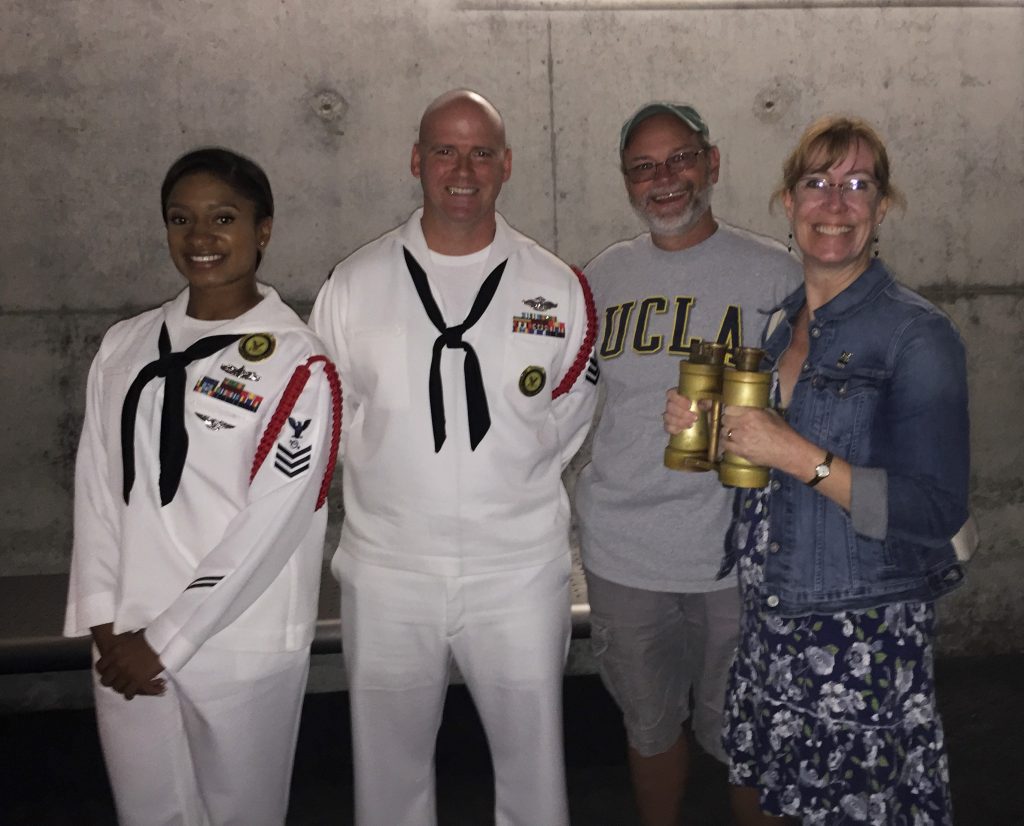
Two Navy docents from Great Lakes at the Chicago Museum of Science and Industry (our son’s RDC is the gentleman in white), my husband, and me holding the actual binoculars from U-505! (Photo: Sarah Sundin, August 2016)
Capture of the U-505—Part 1
On May 15, 1944, the USS Guadalcanal departed Norfolk, VA, with a goal—not just to sink U-boats, but to capture one intact. Capt. Daniel Gallery was convinced it was possible, and he instructed the crews of the five destroyer escorts in Task Group 22.3 to draw up plans and prepare boarding parties.
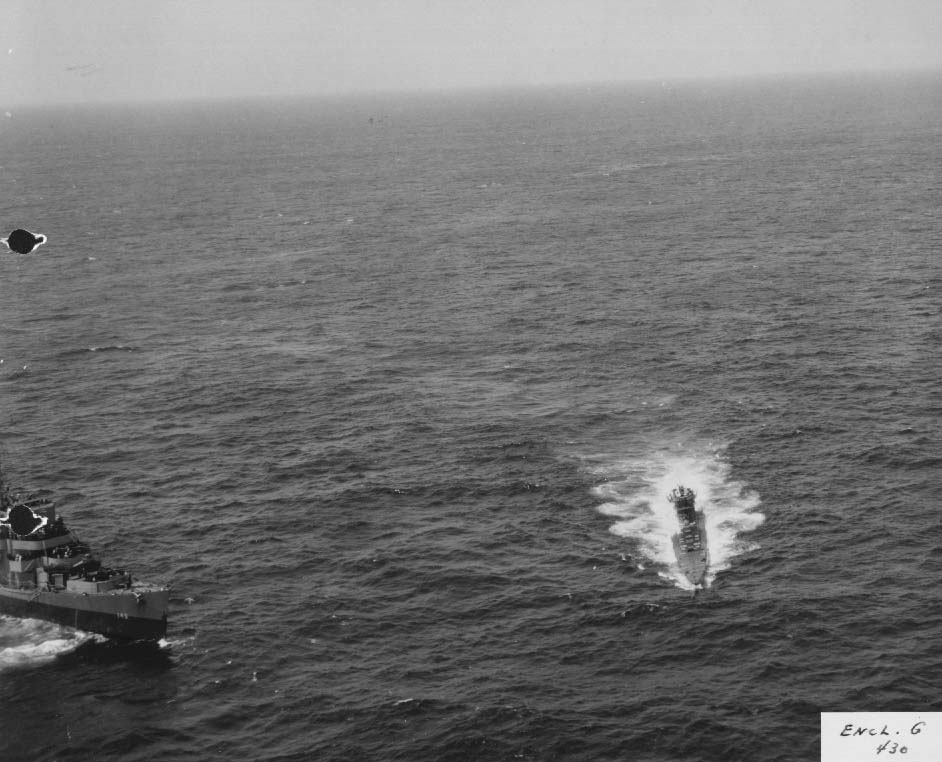
Destroyer escort USS Chatelain closing on damaged German sub U-505, 4 June 1944 (US National Archives)
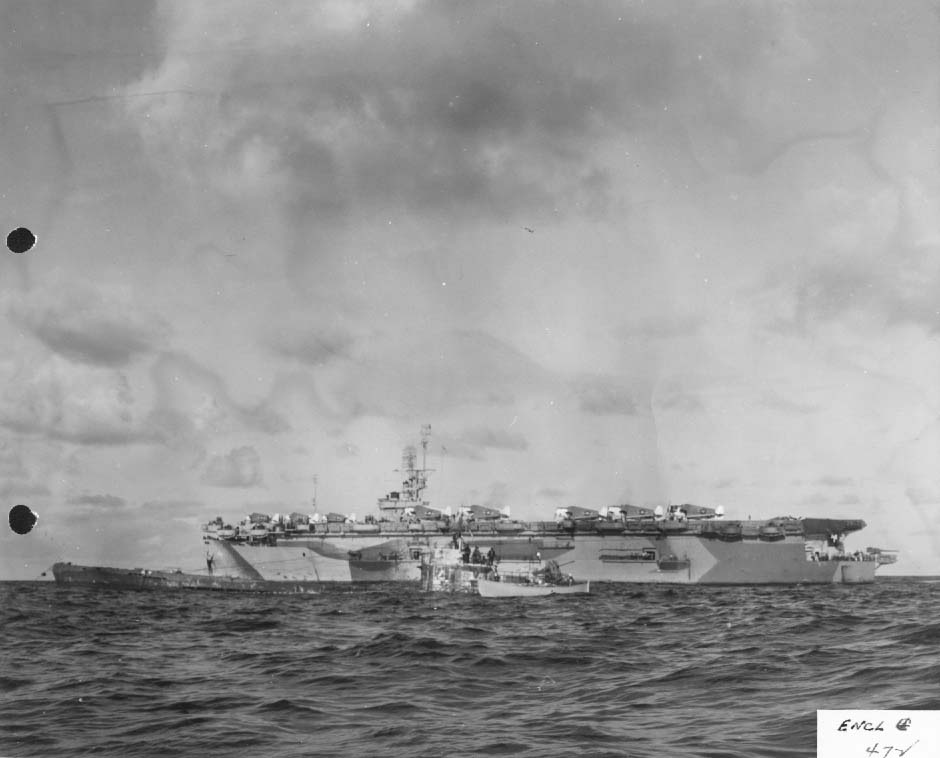
Casablanca-class escort carrier USS Guadalcanal alongside captured U-505, June 1944 (US National Archives)
While patrolling off the coast of West Africa on May 31, the Guadalcanal received a message from the US Tenth Fleet—they had intelligence of a German submarine about 300 miles north of their current position. Although low on fuel, Captain Gallery decided to investigate.
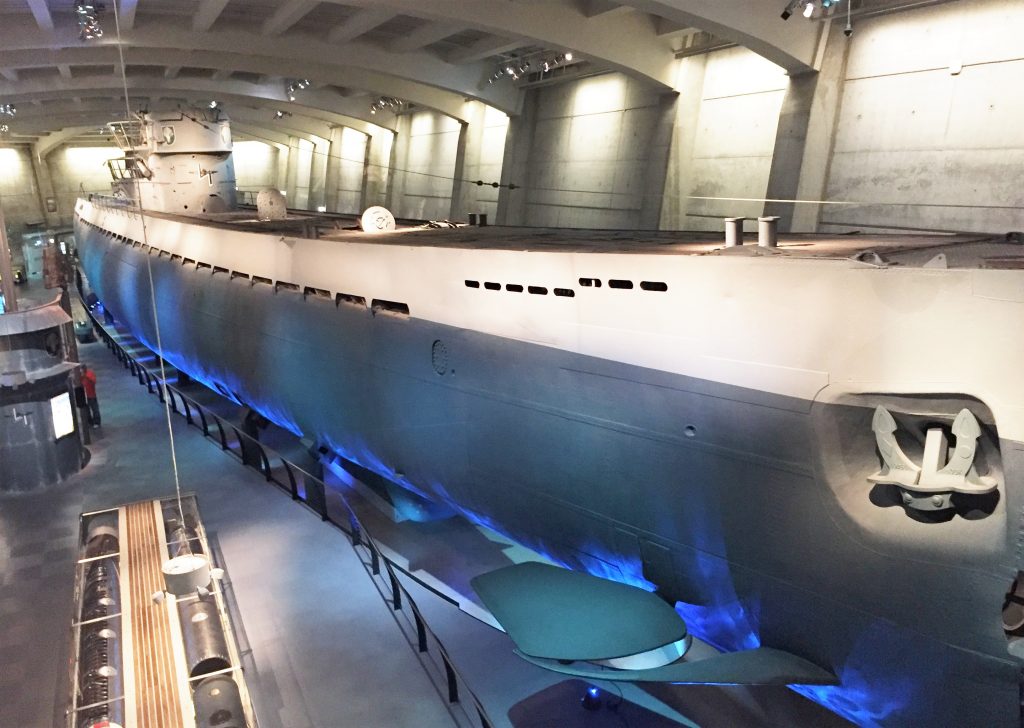
U-505, Chicago Museum of Science and Industry (Photo: Sarah Sundin, September 2016)
The Guadalcanal carried 12 Avenger torpedo bombers and 9 Wildcat fighters. Five destroyer escorts formed the rest of TG 22.3—the Chatelain, Flaherty, Jenks, Pillsbury, and Pope.
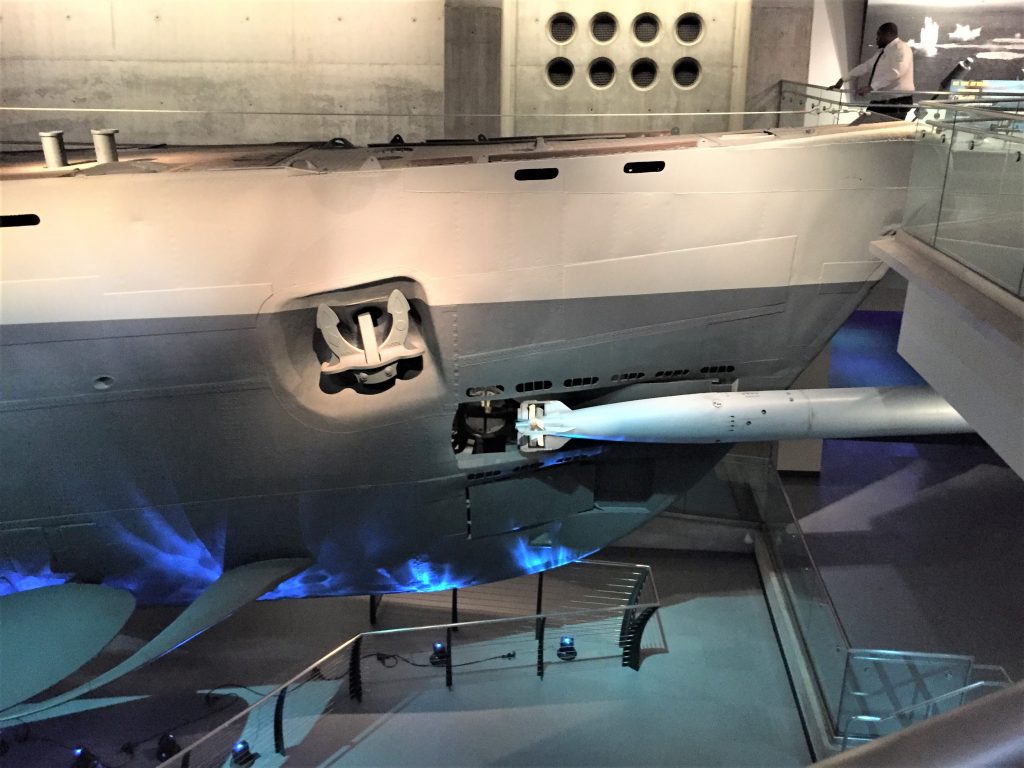
Bow of U-505 with torpedo, Chicago Museum of Science and Industry (Photo: Sarah Sundin, September 2016)
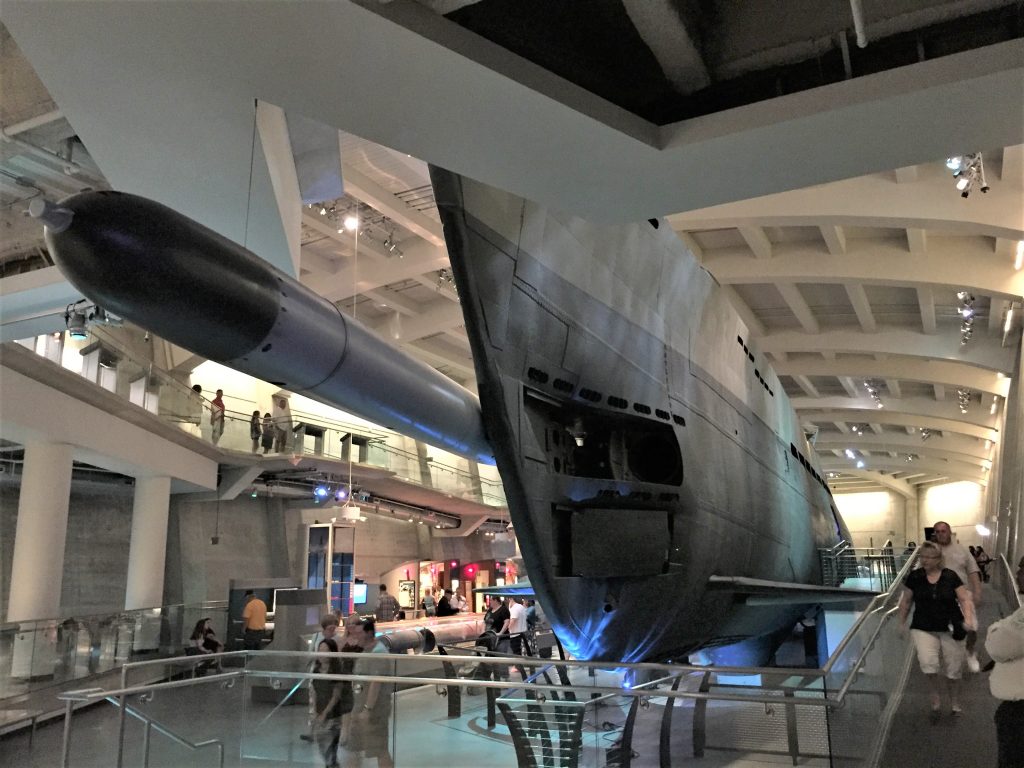
Bow of U-505 from underneath, Chicago Museum of Science and Industry (Photo: Sarah Sundin, September 2016)
On June 4, 1944 at 11:09 am, the USS Chatelain made a sound contact and verified it as a submarine within three minutes. Meanwhile, the crew of the U-505 was sitting down to lunch when their sonar picked up propeller sounds overhead. Oberleutnant zur See Harald Lange, the captain of the U-505, ordered the boat to periscope depth to investigate. To his shock, he saw three destroyer escorts and an escort carrier.
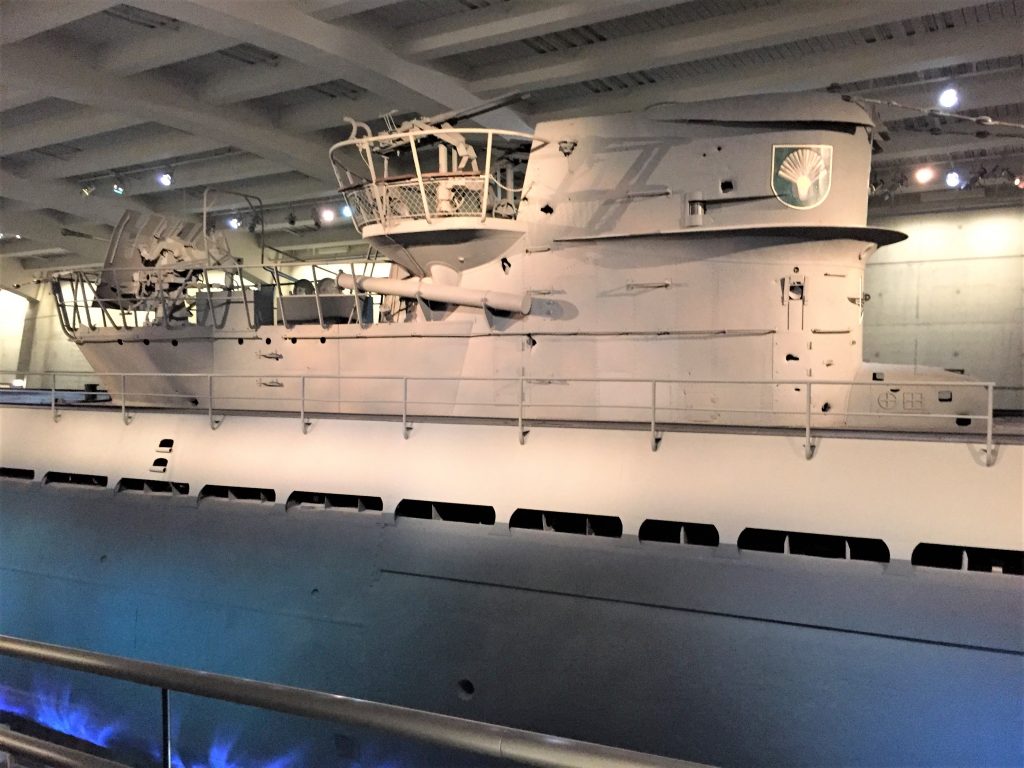
Conning tower of U-505, Chicago Museum of Science and Industry (Photo: Sarah Sundin, September 2016)
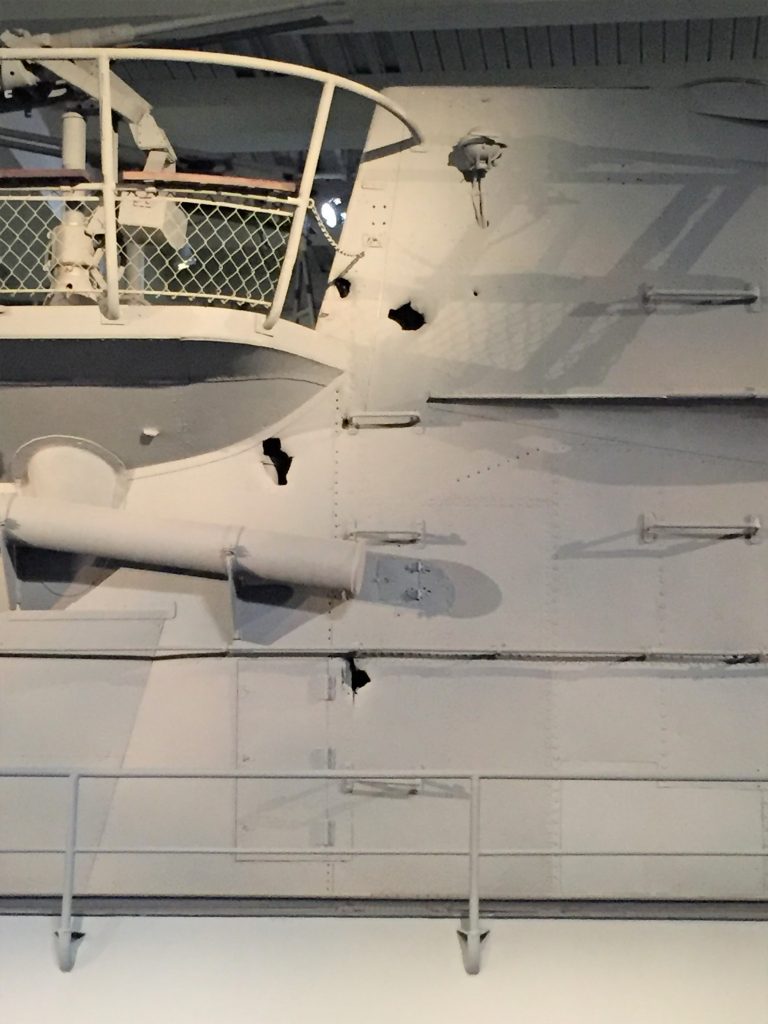
Damage to the conning tower of U-505, Chicago Museum of Science and Industry (Photo: Sarah Sundin, September 2016)
Immediately, Lange ordered the sub to dive, but it was too late. Wildcats overhead directed machine-gun fire at the diving sub to mark the position, and the Chatelain threw a salvo of “Hedgehog” depth charges. They found their mark.
The U-505 began flooding and her rudder jammed, causing her to circle. After firing a single torpedo, which did no damage, Lange realized the U-boat was doomed, and he chose to save his crew. He ordered the boat to surface and the crew to abandon and to scuttle the sub.
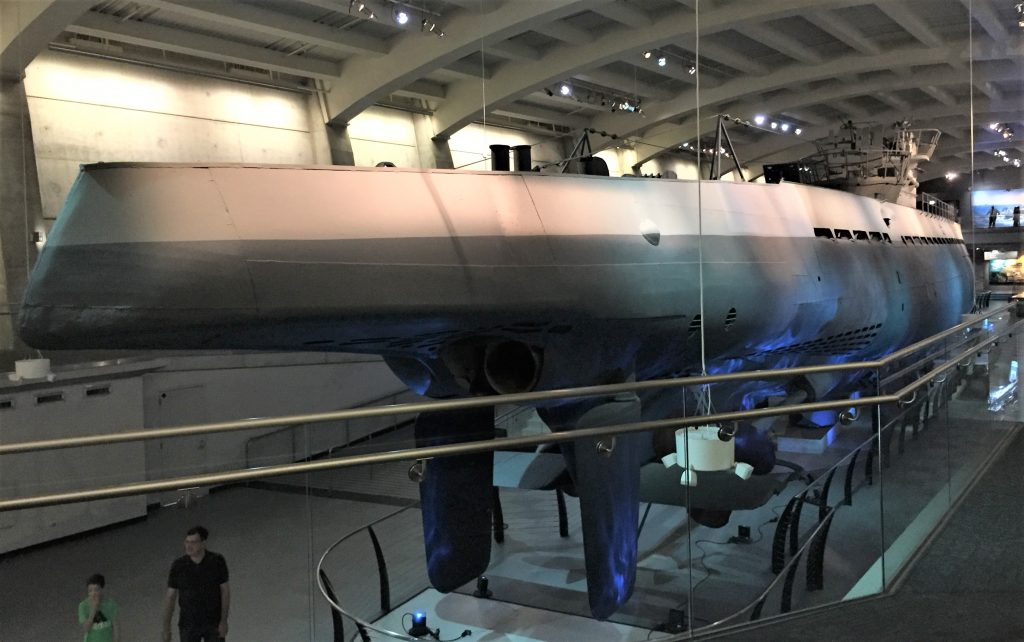
Stern of U-505, Chicago Museum of Science and Industry (Photo: Sarah Sundin, September 2016)
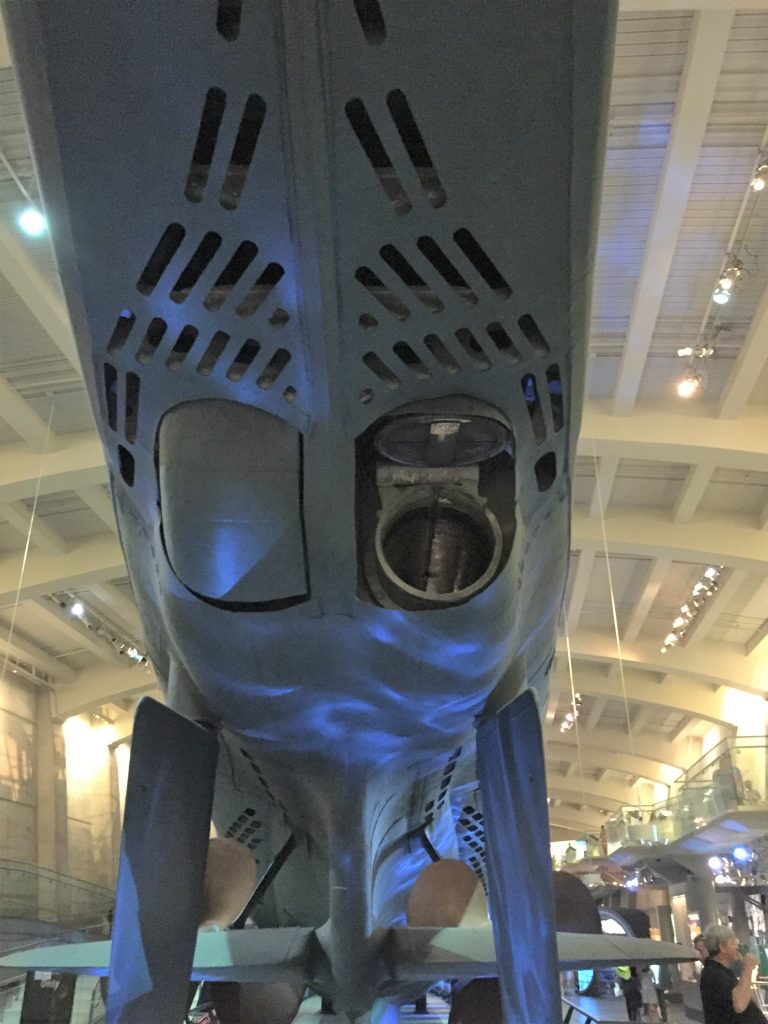
Stern torpedo tubes of U-505, Chicago Museum of Science and Industry (Photo: Sarah Sundin, September 2016)
Following Gallery’s orders, the US ships and aircraft did not attempt to sink the surfaced sub but fired smaller caliber weaponry to encourage the Germans to continue to abandon ship. The submariners poured out of the hatch. Several were wounded, including Lange, but only one crewman was killed. The battle was over quickly. At 1127, the Americans ceased firing and picked up the 58 survivors.
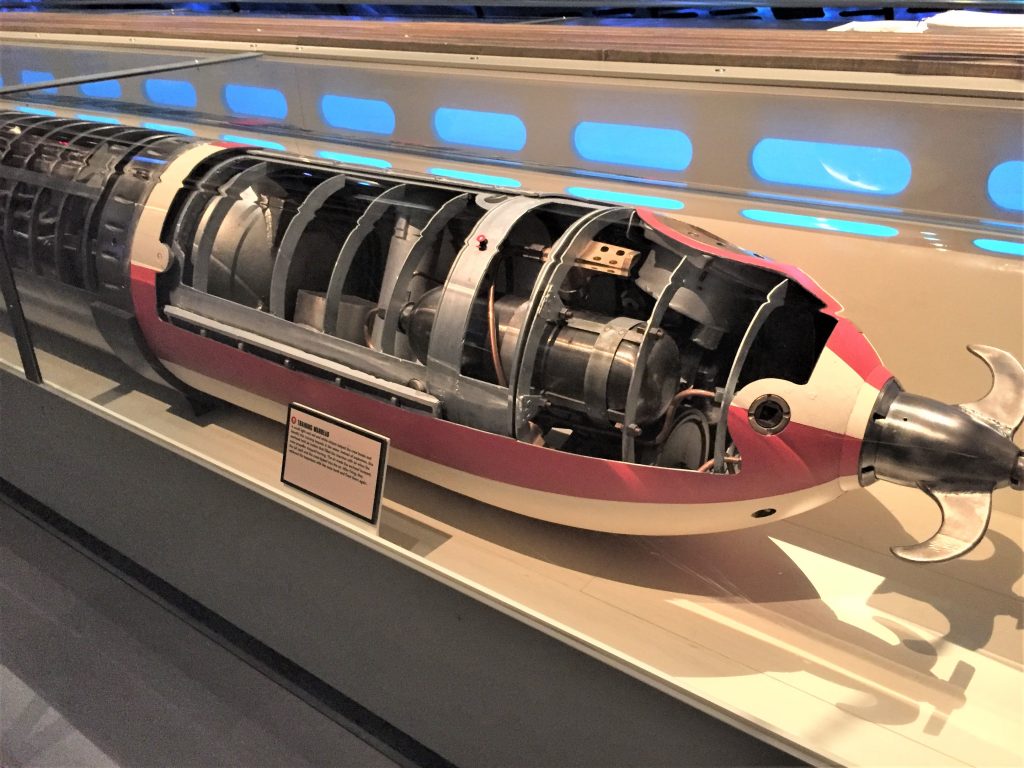
Display of German torpedo, Chicago Museum of Science and Industry (Photo: Sarah Sundin, September 2016)
But the story was only beginning. Read the rest of the story here! And see pictures from inside the U-505!
See more sights from When Tides Turn!
References:
Wise, James E., Jr. U-505: The Final Journey. Annapolis, MD: Naval Institute Press, 2005.
Y’Blood, William T. Hunter-Killer: U.S. Escort Carriers in the Battle of the Atlantic. Annapolis, MD: Bluejacket Books, 1983.
http://www.uboatarchive.net/U-505.htm (Tons of primary source documents, logs, and photographs).



Wow, talk about doing your homework 🙂
I love seeing all the research you’ve done for your books. I’ll bet you had so much fun doing it. The pictures are so imformitive.
I love reading historical books like this because you really get a feel for things they were back then,a true authentication. Keep up the great work! I really look forward to reading your books!
The pictures are cool! I can’t wait to read the new book. And I love the sticky notes!
[…] and/or on Monday’s Tour of Boston post, Tuesday’s Tour of Vermilion post, and the upcoming U-boat Tour posts. You can earn extra entries by leaving a comment on each post. If you can’t leave a […]
[…] only please), and/or on Monday’s Tour of Boston post and the upcoming Tour of Vermilion and U-boat Tour posts. You can earn extra entries by leaving a comment on each post. If you can’t leave a […]
[…] comment below (US & Canada only please), and/or this week’s coming Tour of Vermilion and U-boat Tour posts. You can earn extra entries by leaving a comment on each post. If you can’t leave a comment, […]
My neck of the woods! I remember seeing the U-505 as a child when it was merely “attached” to the Museum of Science and Industry. After years of exposure to the damaging weather of Chicago’s lakefront, this enormous addition was built to house it. Moving the sub inside was a feat of engineering, and a story itself. Thanks, Sarah! So glad you loved it!
We loved seeing the U-boat at the MSI!!
This is SO cool! I must go and visit!
And this is why I love reading your books !! All hands on deck …anchors away!!
Fascinating pictures. What a story it has!
I love history! My children just finished a portion of their homeschooling about WWII, so learning different aspects about it is great! Thank you!! I love your books!
Thanks for the pictures and history lesson. Lived seeing how you have done your research!
This is an incredible story! I can’t wait to read tomorrow’s post and see the pictures you post on it.
I love your enthusiasm and all the in depth research you do to make your books as authentic as possible!! I appreciate you providing us with these Virtual Tours as they help me visualize when I read about the places and boats in your books!! PLEASE keep these fantastic books coming!!
Wow! What an exciting story! I can’t imagine how satisfying that was for all of our sailors that were involved.
Thank you Sarah for this fascinating story and sharing all these pictures! Never had such a close up look at a U boat before! Also appreciated the exciting and detailed story,you shared with us. Was very glad for our victory and that it cost as few lives as possible.
Very interesting post. I just started reading When Tides Turn and I love it already.
I love the way you bring history to life!
This is so very neat! I’m loving all these WWII pics!
Your thorough research makes your books so realistic! I feel like I am living during that time. Thank you for your books. I love your writing!!!!!
These photos are AMAZING! Thank you so much for sharing with us! 🙂
Wow! I’m really enjoying learning more about this part of the war! And the pictures are amazing.
Since they didn’t destroy it does that mean they found a lot of information the Germans had?